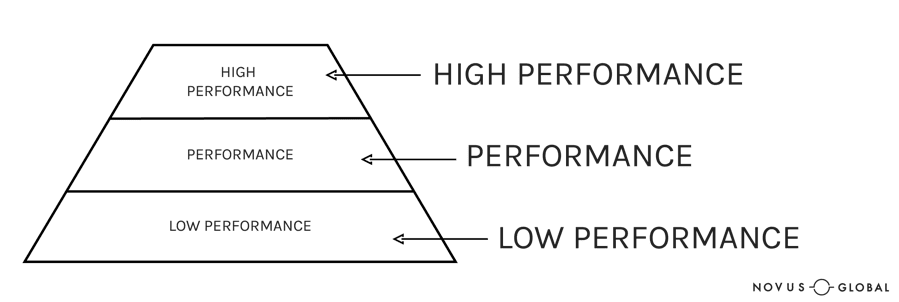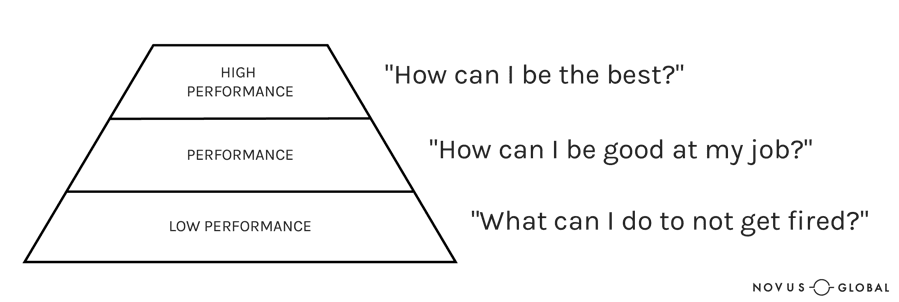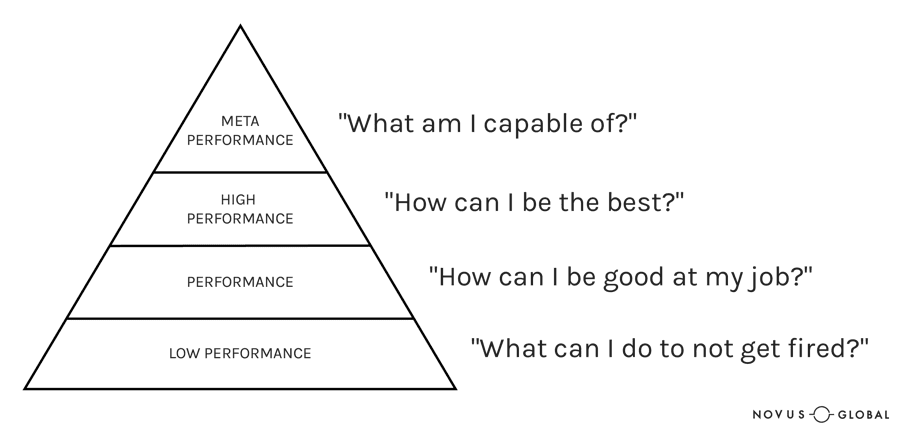To remain relevant in the 21st century you will have to reinvent yourself, not just once but repeatedly. – Yuval Noah Harari
Most of what people think about unleashing human performance is wrong.
Current management models typically divide employees or volunteers into three general categories:

People at the different levels of performance tend to ask different types of questions of themselves.
1) Low-performers ask the question, “What’s the least amount of work I can do and not get fired?” They don’t usually say this out loud, but it guides their behavior.
2) Performers ask the question, “How can I do a good job?” These people don’t want to be horrible but they don’t want to be great either.
3) High-performers ask the question, “How can I be the best?” Much ink (or zeros and ones) has been spilled writing about high-performers and how to attract and retain them. But at Novus Global we believe attracting and retaining high-performers is a mistake and doing so creates a predictable set of problems.

Two Problems with High-Performers
Recently I spoke with some leaders from a Fortune 100 Company. I asked them to describe their team and they were quick to say, “We’re a group of high-performers.”
“Great,” I say. “So, what’s the problem?”
“Well,” they said, shifting in their seats, “It’s like this…”
The conversation sounded exactly like what I had heard from dozens of other high-performing companies across the world. Let’s see if any of these sound familiar.
- They’re resistant to feedback (This is because any feedback threatens their identity as a high-performer).
- They can become both simultaneously overwhelmed and bored. (Overwhelmed, because they feel like their plate is full. Bored, because they don’t feel like they’re growing.)
- They develop resentment from other employees that are not performing as well. (But do nothing to help them–because that would require growth.)
- They get jealous of others who surpass them. (Sometimes unconsciously conspiring against other’s growth.)
This creates what we call the arrogance of limited success. And we see this in our work every day. But this isn’t the only problem with high-performance.
The other problem is high-performance is attainable. You can be the best. In your department. At your company. In the world.
And simply knowing that fact tends to keep people from attaining it.
Ever notice how most people and teams hit a little below where they aim? This is because accomplishment comes with its own burden: the burden of having to discover what comes next. This burden creates a magnetic push away from accomplishment. It’s what creates an experience that many feel but few articulate: avoiding the pain of success.
And both these psychological barriers–the arrogance of limited success and fear of the pain of success–are present but invisible, and consequently harder to deal with, in high-performers and high performing teams.
What To Do About It?
To overcome these challenges, you must become obsessed with a question few leaders ask: “What comes after high performance?”
Highlight, memorize, brand this next sentence into your mind: If your team doesn’t have a clear and compelling answer to the question “What comes after high performance?” then you absolutely have an unnecessary cap on the possibilities of your leadership and the impact of your organization.
So, what comes after high-performance? Let me be the first to introduce you to the idea of meta-performance.
Not “meta” like “meta-data” but “meta” as in “metamorphosis.” Like a caterpillar transforming into a butterfly.
A meta-performer isn’t committed to be the best (how dull)…
… a meta-performer is committed to constantly exploring capabilities.

While answering the question, “How can I be the best?” has a finite answer, asking, “What am I capable of accomplishing” has infinite answers. Because human potential has fewer limits than human competition.
Meta-performers are never done. Not only do they have room to grow but they relish and create new opportunities to grow.
Dwayne Johnson is a meta-performer. He was a failed football player who changed his name to Rocky Maivia for the WWF and then changed his name to The Rock to become one of the most famous professional wrestlers in the world.
Then he left professional wrestling and changed his name to Dwayne The Rock Johnson to become one of the world’s most famous actors. Then he changed his name again back to just Dwayne Johnson, as one of the most powerful media producers in the world.
In 2020 he may run for President of the most powerful country in the world.
Mr. Johnson is a man who consistently expands his horizons to explore his capabilities.
Just imagine what it would look like if you were a meta-performer and were leading a meta-performing team.
So how do you begin to do that?
How to (Self) Manage for Meta-Performance:
I was recently at an event where Netflix former head of human resources spoke. She was one of the first 30 employees-back when you could address the entire company by standing on a chair. She talked about infamous “PIPs”-performance improvement plans-and how people hate them because they’re seen as a form of punishment or a legal paper trail so you can fire someone without getting sued.
Create goals where you’re fully committed to paying the price to reinvent yourself and accomplish the impossible.
During her presentation, I realized something about the culture of our firm: every single coach in our firm is on a performance improvement plan from the second they get hired. We don’t do this because people start in trouble. We do this because we have a base assumption about coaches in our firm that they want to grow. They don’t want to be the best. They want to explore what their capabilities.
For example, every fourth quarter we start looking at next year’s goals and hold a space for our coaches to get clear on what they’re committed to achieve. Our coaches can pick whatever goals they want, but they have to meet two criteria:
1. The goal has to be seem improbable or impossible to them.
2. The goal has to be worth the cost of whatever it would take for them to grow to achieve it.
One of the greatest joys of leading Novus Global is seeing how year after year our coaches grow to achieve in December what they thought was impossible twelve months earlier.
That’s the first step to becoming meta-performing: create goals where you’re fully committed to paying the price to reinvent yourself and accomplish the impossible.
How it Feels to Do the Impossible
A few years ago, we were brought in to help a nationwide company close a $20 million budget shortfall. This is not a job for high-performers. High-performers will do their best. Usually they think they’re already doing their best, which is why they struggle to increase their performance. No, this was a job for meta-performers.
Our firm spent a year traveling the country working with their teams, doing two-day trainings and months of coaching with hundreds of their leaders, inviting them to see themselves as meta-performers and unlearning the bad habits of high-performers.
At the end of the year they didn’t close the $20 million gap. Instead, they surpassed the budget by over $10 million dollars.
This is the power of meta-performing cultures. What was previously thought to be impossible becomes possible.
One of my favorite quotes from Walt Disney is, “It’s kind of fun to do the impossible.”
Most people think he’s using understatement. We think, “Kind of fun? Are you kidding? I think it would be really fun to do the impossible.”
That’s because they’ve never done the impossible. To those who have never done the impossible, it feels daunting. To those who regularly do the impossible, it feels like any other day.
What I called ‘impossible’ is what I now call ‘Tuesday.”
The greatest thrill of our work is when our clients tell us, “If you would have told us a year ago these would be the results from our leadership, we would have told you–impossible. But now what we used to call ‘impossible’ we call ‘Tuesday.’”
That’s what meta-performers do. They turn the impossible into Tuesday.
As you look at your goals for 2019, ask yourself: are my goals performing, high-performing or meta-performing?
And may you discover the rush of exploring what you’re capable of. May you all look back when this year is over and say, “What I called ‘impossible’ is what I now call ‘Tuesday.’”
May you all go beyond high-performance.
May you all become meta-performers.
Jason Jaggard
Coach, Speaker, Author and Founder | Novus GlobalCan You Go Beyond High Performance?
TOPICS IN THIS ARTICLE
ExecutionLeading OrganizationsPerformance ManagementTo remain relevant in the 21st century you will have to reinvent yourself, not just once but repeatedly. – Yuval Noah Harari
Most of what people think about unleashing human performance is wrong.
Current management models typically divide employees or volunteers into three general categories:
People at the different levels of performance tend to ask different types of questions of themselves.
1) Low-performers ask the question, “What’s the least amount of work I can do and not get fired?” They don’t usually say this out loud, but it guides their behavior.
2) Performers ask the question, “How can I do a good job?” These people don’t want to be horrible but they don’t want to be great either.
3) High-performers ask the question, “How can I be the best?” Much ink (or zeros and ones) has been spilled writing about high-performers and how to attract and retain them. But at Novus Global we believe attracting and retaining high-performers is a mistake and doing so creates a predictable set of problems.
Two Problems with High-Performers
Recently I spoke with some leaders from a Fortune 100 Company. I asked them to describe their team and they were quick to say, “We’re a group of high-performers.”
“Great,” I say. “So, what’s the problem?”
“Well,” they said, shifting in their seats, “It’s like this…”
The conversation sounded exactly like what I had heard from dozens of other high-performing companies across the world. Let’s see if any of these sound familiar.
This creates what we call the arrogance of limited success. And we see this in our work every day. But this isn’t the only problem with high-performance.
The other problem is high-performance is attainable. You can be the best. In your department. At your company. In the world.
And simply knowing that fact tends to keep people from attaining it.
Ever notice how most people and teams hit a little below where they aim? This is because accomplishment comes with its own burden: the burden of having to discover what comes next. This burden creates a magnetic push away from accomplishment. It’s what creates an experience that many feel but few articulate: avoiding the pain of success.
And both these psychological barriers–the arrogance of limited success and fear of the pain of success–are present but invisible, and consequently harder to deal with, in high-performers and high performing teams.
What To Do About It?
To overcome these challenges, you must become obsessed with a question few leaders ask: “What comes after high performance?”
Highlight, memorize, brand this next sentence into your mind: If your team doesn’t have a clear and compelling answer to the question “What comes after high performance?” then you absolutely have an unnecessary cap on the possibilities of your leadership and the impact of your organization.
So, what comes after high-performance? Let me be the first to introduce you to the idea of meta-performance.
Not “meta” like “meta-data” but “meta” as in “metamorphosis.” Like a caterpillar transforming into a butterfly.
A meta-performer isn’t committed to be the best (how dull)…
… a meta-performer is committed to constantly exploring capabilities.
While answering the question, “How can I be the best?” has a finite answer, asking, “What am I capable of accomplishing” has infinite answers. Because human potential has fewer limits than human competition.
Meta-performers are never done. Not only do they have room to grow but they relish and create new opportunities to grow.
Dwayne Johnson is a meta-performer. He was a failed football player who changed his name to Rocky Maivia for the WWF and then changed his name to The Rock to become one of the most famous professional wrestlers in the world.
Then he left professional wrestling and changed his name to Dwayne The Rock Johnson to become one of the world’s most famous actors. Then he changed his name again back to just Dwayne Johnson, as one of the most powerful media producers in the world.
In 2020 he may run for President of the most powerful country in the world.
Mr. Johnson is a man who consistently expands his horizons to explore his capabilities.
Just imagine what it would look like if you were a meta-performer and were leading a meta-performing team.
So how do you begin to do that?
How to (Self) Manage for Meta-Performance:
I was recently at an event where Netflix former head of human resources spoke. She was one of the first 30 employees-back when you could address the entire company by standing on a chair. She talked about infamous “PIPs”-performance improvement plans-and how people hate them because they’re seen as a form of punishment or a legal paper trail so you can fire someone without getting sued.
During her presentation, I realized something about the culture of our firm: every single coach in our firm is on a performance improvement plan from the second they get hired. We don’t do this because people start in trouble. We do this because we have a base assumption about coaches in our firm that they want to grow. They don’t want to be the best. They want to explore what their capabilities.
For example, every fourth quarter we start looking at next year’s goals and hold a space for our coaches to get clear on what they’re committed to achieve. Our coaches can pick whatever goals they want, but they have to meet two criteria:
1. The goal has to be seem improbable or impossible to them.
2. The goal has to be worth the cost of whatever it would take for them to grow to achieve it.
One of the greatest joys of leading Novus Global is seeing how year after year our coaches grow to achieve in December what they thought was impossible twelve months earlier.
That’s the first step to becoming meta-performing: create goals where you’re fully committed to paying the price to reinvent yourself and accomplish the impossible.
How it Feels to Do the Impossible
A few years ago, we were brought in to help a nationwide company close a $20 million budget shortfall. This is not a job for high-performers. High-performers will do their best. Usually they think they’re already doing their best, which is why they struggle to increase their performance. No, this was a job for meta-performers.
Our firm spent a year traveling the country working with their teams, doing two-day trainings and months of coaching with hundreds of their leaders, inviting them to see themselves as meta-performers and unlearning the bad habits of high-performers.
At the end of the year they didn’t close the $20 million gap. Instead, they surpassed the budget by over $10 million dollars.
This is the power of meta-performing cultures. What was previously thought to be impossible becomes possible.
One of my favorite quotes from Walt Disney is, “It’s kind of fun to do the impossible.”
Most people think he’s using understatement. We think, “Kind of fun? Are you kidding? I think it would be really fun to do the impossible.”
That’s because they’ve never done the impossible. To those who have never done the impossible, it feels daunting. To those who regularly do the impossible, it feels like any other day.
The greatest thrill of our work is when our clients tell us, “If you would have told us a year ago these would be the results from our leadership, we would have told you–impossible. But now what we used to call ‘impossible’ we call ‘Tuesday.’”
That’s what meta-performers do. They turn the impossible into Tuesday.
As you look at your goals for 2019, ask yourself: are my goals performing, high-performing or meta-performing?
And may you discover the rush of exploring what you’re capable of. May you all look back when this year is over and say, “What I called ‘impossible’ is what I now call ‘Tuesday.’”
May you all go beyond high-performance.
May you all become meta-performers.
Never miss an inspiring leadership insight or the latest leadership news!
About the Author
Jason Jaggard
Coach, Speaker, Author and FounderNovus Global
Jason Jaggard is an entrepreneur, author, executive coach and speaker. His work has been translated into over 50 languages and has been featured in Fast Company, Forbes, Entrepreneur and Chief Executive Magazine. He is the founder of Novus Global, an executive coaching firm working with Fortune 500 companies, professional athletes, elected officials and some of the most famous entertainers on earth. He also co-founded and is on the faculty of The Meta Performance Institute, which helps coaches create six figure practices serving high performing leaders and teams. His next book, Beyond High Performance: What Great Coaches Know about How the Best Get Better is out this May, 2023.